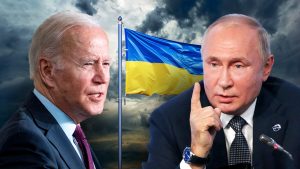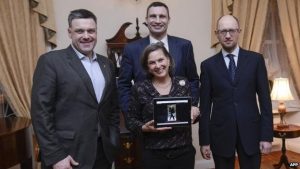Pain in The Ukraine

by G. Murphy Donovan (February 2022)
“The best political, social, and spiritual work we can do is to withdraw the projection of our shadow onto others.” – Carl Jung
After 75 years, the Cold War seems to be a permanent fixture of American foreign policy. Russia is still the nexus of allied angst. Never mind that Slavic communism has morphed into Russian capitalism. Moscow still enjoys pride of place for eight decades now in the American and NATO threat matrix. Never mind that Red China and the Muslim jihad, in the same period, are eating Uncle Sam’s strategic lunch. National policy towards both Beijing and Mecca now amount to abject, if not fawning, appeasement. Hong Kong and Kabul have now gone the way of Yugoslavia. Taiwan and Pakistan are probably next. American foreign policy today seems to mandate that the Russian threat be exaggerated while the Chinese and Islamist menace is minimized or worse still, ignored.
Late in the last Century, a good friend of mine was serving as US Army attaché in Moscow, an eyewitness to that Russian “revolution without guns.” In several discussions, at the time, we both agreed the collapse of the Soviet Union and the Warsaw Pact offered a golden opportunity to bring Russia back into the European fold of allies; enlightened capitalism maybe, if not genuine democracy. Surely, America had more security, cultural, or strategic affinity with Moscow than she did with Beijing or Mecca. My attaché friend (Col. Jeffrey Barrie, Citadel ‘65) a Jewish American with Russian antecedents, agreed that any attempt by EU/NATO consortium to fill the vacuum in eastern Europe would kill any hope of rapprochement with the new and now diminished Russian phantasm.
Recall Frank Fukuyama’s 1989 End of History argument where the RAND Corporation cum State Department intellectual argued that, with the fall of Soviet empire, liberal democratic ideals were triumphant globally, establishing a milestone in human political history.
In fact, the last decade of the last Century was a tipping point, albeit not the one Pollyannas like Fukuyama prophesized. With the fall of the Warsaw Pact, Marxist socialism morphed into viral, if not paranoid, Russian nationalism; indeed, a nation that now believes itself besieged by an imperial EU and NATO slow marching to Rodina’s borders. With the help of American demagogues, right and left, Putin is now a permanent fixture of American domestic and foreign hate politics.
Back in the 90s, some of us thought the smart money would not exploit Russian historical paranoia, or the alliance vacuum in Eastern Europe. After all, surely Moscow had legitimate legacy interests with Russian speakers in former Warsaw Pact states, real security concerns with their new federation border. In short, my attaché chum and I thought that Washington might want to take yes for an answer, instead of looking for yet another fight with Moscow in Eastern Europe.
We were as wrong as Fukuyama was optimistic.
At the turn of the Century, European threat perceptions were revectored from West to East. Imperial NATO seems to be creeping towards target Moscow. Needless to say, given East Europe’s experience with 50 years of Communism, it’s easy to see how the EU and NATO, post-war victims of affluence, might be mistaken for 21st Century security blankets.
Pushback from Russia under Vladimir Putin was not long in coming, especially after America and NATO dismembered Tito’s Yugoslavia, siphoning off new EU/NATO member states and taking sides in vintage Muslim/Christian sectarian feuds, that longstanding religious “clash of civilizations” in the Balkans. Worse still, two new majority Muslim states, Bosnia and Kosovo, emerged from the Yugoslav carnage, states that would subsequently provide more jihadists to ISIS in the Levant than any other countries of comparable size.
Muslim sectarian warfare in the Levant surely inspired copycat memes in the Balkans. One clear signal that Moscow got from the implosion of sovereign Yugoslavia was NATO’s hidden agenda. After the Soviet Union, the Warsaw Pact and Yugoslavia were dismantled, it wasn’t hard to believe that the Russian Federation might be next. American intrigues on Russian European and far East borders, with Muslim terrorists in Chechnya and jihadists in Afghanistan, probably just added fuel to the existing flames of Russian paranoia.
Eventually, Putin drew a line in Ukraine.
Retrieving Crimea was a no-brainer for the Kremlin on several counts; ninety percent of the population are ethnic Russians, a vast majority favor Moscow over Kiev anyway, and Crimea is host to the Sevastopol naval base, an important strategic nuclear asset on the Black Sea. Any notion that Moscow will gift Sevastopol to a hostile and corrupt regime in Kiev is as likely as Washington giving Pearl Harbor back to the Hawaiians.
As for other loci of strategic sensitivities, like Georgia, Putin is not any more likely to abide hostile EU border states or NATO forces across the Russian frontier any more than Americans will tolerate hostile regimes or Russian military forces in Cuba, Mexico, or Canada.
We could do worse than think of that Russian military exercise opposite Ukraine ongoing today as Moscow’s version of the Monroe Doctrine.

Victoria Nuland with Maidan neo-Nazis in Kiev
American foreign policy and clandestine operations in Ukraine follow a pattern set by CIA in post war Italy. If CIA or the Oval office (it’s not clear which is in charge anymore) doesn’t like the politics of some foreign regime, we mobilize clandestine subversives to do their worst. Diplomacy is usually a fig leaf or a side show.
The so-called Maidan revolt in Kiev is probative, another dicey chapter in the annals of American sponsored coups and misadventures. When Ukraine President Yanukovych looked East instead of West in 2014, his regime had to go, even if Ukrainian neo-Nazis had to be used to do the dirty work.
Global busybodies like the US State Department and CIA will exploit chaos, yet the primary sources of instability in Ukraine are internal. Kiev is probably the most corrupt capital in Europe. America underwrites abuses there as long as corruption genuflects West not East. If you lose an election in Kiev, you are likely to find yourself tried for treason. Poroshenko is the latest ex-president in the dock.
Kiev-like politics now have obvious echoes inside the Beltway.
Professor Peter Beinart describes corrosive American foreign policy bias as “delusions of innocence;” that is, “the predisposition of Americans to think well of ourselves and to dismiss the stated concerns of others as rooted in dishonesty or bad faith.” In short, Beinart believes Americans and allies have lost the ability to appreciate and consider the security concerns of others – or maybe any contrarian foreign policy perspectives.
The modalities of recent Geneva negotiations on Ukraine illustrate American hubris and conceit. Lavrov and Blinken are rolling Kiev’s bones without Ukrainian players. Kiev is going to have to live with what the big dogs decide – or else.
So much for national sovereignty in the Ukraine.
Political arrogance in Washington today has more than a tinge of schizophrenia, a kind clinical corruption. The rank and file, deep state, Beltway apparatchik is a partisan, a Democrat at best, or a militant socialist at worst. In foreign policy however, there is little tolerance for any foreign policy other than, to coin a phrase, “neoconic Rusophobia”.
On most matters, the steady state, including so-called national security establishment and media vassals, is well left of the American center. A side-by-side looped video of contrasting Russian and American recruiting arguments illustrate, visually, the state of play even in Pentagon military culture, must see TV these days.
Effective propaganda always contains pearls of prescience.
Peter Beinart’s “delusions of innocence,” alas, are not the only illusions in play as we lurch towards another proxy war in Ukraine. NATO is a paper tiger and Vladimir Putin and General Valery Gerasimov know it.
Any alliance whose members cannot or will not pay for itself is unlikely to put any troops in harm’s way. Indeed, given what we know about Europe’s behavior in WWII; continental Europe, especially the northern tier, is likely to fold like a cheap tent in any genuine military confrontation with Russia.
Predictably, the Oval Office has already telegraphed its punches by saying it will not send American troops to fight with or save Ukraine. Good thing. American armed forces are probably the best trained, best equipped troops led by the most politicized general officer corps in US history. After a 50-year occupation, Russian troops, for the most part, are gone from Soviet Europe while American troops, bases, and weapons still remain after nearly 75 years. Calling new American deployments to East Europe “defensive” is about as truthful as calling Victoria Nuland the patron saint of Ukrainian “democracy.”
History, however, should still be still instructive. Armchair Russophobic warriors would do well to remember that Nazis and Fascists in Europe were defeated, for the most part, by Marshal Georgi Zhukov, not General Dwight D. Eisenhower.
Addendum
For a more complete discussion of the origins, motives, hazards, and culpability for the Ukraine crisis see John Mearsheimer’s (University of Chicago) excellent historical survey and analysis at link. Professor Mearsheimer makes the point that America is doubling down on a losing hand. Ukraine is not a strategic concern for America, by our own admission. However, Georgia and Ukraine are vital strategic concerns for Moscow.
We ignore that reality at our peril.
__________________________________
G. Murphy Donovan writes about the politics of national security.
Follow NER on Twitter @NERIconoclast